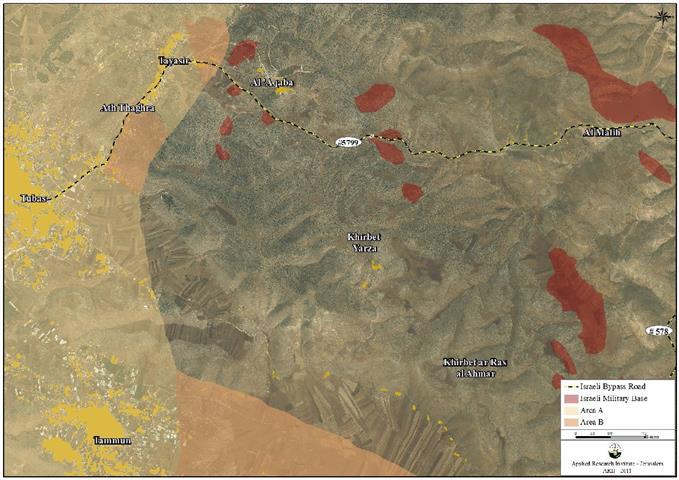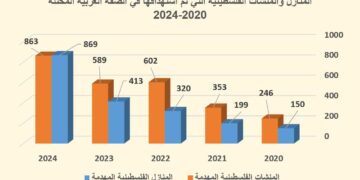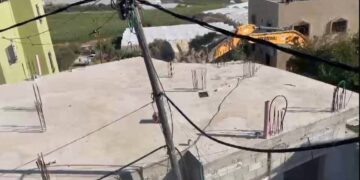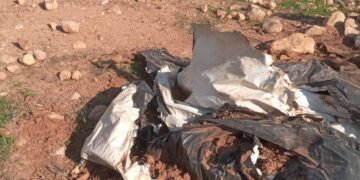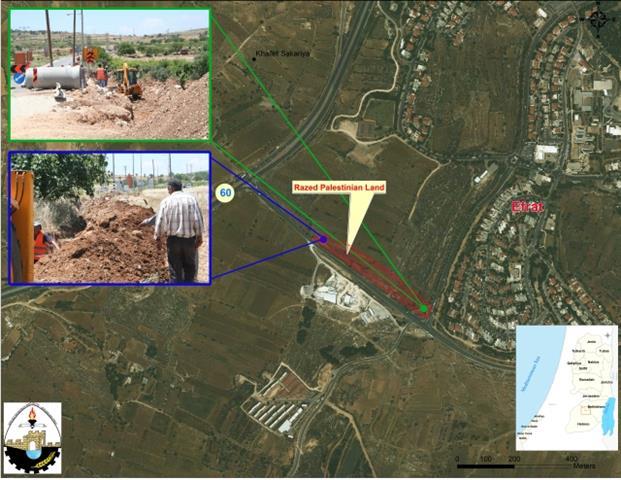The Israeli government has widened its long-term policy of forced displacement of the Palestinian population throughout the Occupied Palestinian Territory, mainly by targeting their houses and properties under Illegal pretexts. On the early morning of June 1, 2011, dozens of Israeli military vehicles stormed Khirbet Yerza east of Tubas city at the northern parts of the West Bank and forced the local residents to evacuate the entire community to pave the way for the Israeli Army to execute a military exercises on their lands. Mr. Mukhles Mesa’eed, the head of Khirbet Yerza village council indicated that the Israeli Army Forces forcibly transferred the residents to a nearby hilltop until the training finished.
Khirbet Yerza had been subjected many times for systematic eradication where on February 9, 2011, the Israeli Occupation Forces verbally notified a number of Palestinian families in Khirbet Yerza in Tubas Governorate in the northern Jordan valley of their intention to destroy their 18 residential barracks, tents, animal barns and fodder stores at any time. It is worth mentioning that the Israeli Occupation Authorities has for several times warned residents of Khirbet Yerza to evacuate the area under the pretext that it is a ‘closed military area’ and residents are not allowed to continue living in it
Khirbet Yerza, a Palestinian community located 6 km to the east of Tubas city, in the north-eastern part of Jordan Valley. It is bordered by Al Malih community to the east, Al ‘Aqaba village to the north, Tubas city to the west and Al Buqai’a Valley area to the south. See the map below:
Map of Khirbet Yerza
Moreover and on May 31, 2011, the Israeli Army bulldozers stormed Khirbet Al Faressiyya east of Tubas in the Jordan valley and demolished two animal sheds owned by the local residents under the pretext of its location in lands classified as “closed military area”. Furthermore and on May 30, 2011, the Israeli Army bulldozers stationed in Al Malih community north of the Jordan valley and demolished 3 residential tents and one animal shed in Nab’ Al Ghazal area in Khirbet Al-Faressiyya.
Mr. ‘Aref Daraghmeh the head of Wadi Al Malih village council indicated that the owners of the demolished structures in Al Malih and Khirbet Al-Faressiyya had submitted a petition to the “what is so-called Israeli Supreme Court” to get a decision to halt the demolition of the targeted structures, but the local residents were surprised by the Israeli bulldozers demolishing their houses without a prior notification.
Khirbet Al-Faressiyya is small Palestinian community east of Tubas city in the northern Jordan Valley. It is bordered by the communities of Kardala, Bardala ‘Aein Al-Beida as well as the Illegal Israeli settlement of Mehola to the north, The Illegal Israeli settlement of Masskeyyott to the south, Al Malih community to the west and the Illegal Israeli settlement of Shedmat Mehola to the east. It is populated by 269 local residents (PCBS 2010), where the agriculture constitutes the main source of income for the residents.
Al Malih is a Palestinian communities located east of Tubas Governorate in the northern parts of the West Bank. It is bordered by Bardala community to the north, Khirbet Al-Hadidieyyeh to the south, Al-Faressiyya as well as the Illegal Israeli settlement of Rotem to the east, Al -‘Aqaba and Tayaseer villages to the west.
It is worth noted that the Palestinian communities of Khirbet Yerza, Al Malih and Khirbet Al-Faressiyya are located in the far north of the Jordan valley and surrounded by a number of Illegal Israeli settlements, where the local Palestinian residents became between the hummer of the “closed military area pretext” and the anvil of the Illegal settlements, which deprived them from their legitimate right to build and expand on their own lands. See the table below:-
|
Table of the Illegal Israeli Settlements in the northern Jordan Valley
|
|
Colony Name
|
Location
|
Date Establishment
|
Population
|
Area-Dunums
|
|
Mehola
|
Tubas
|
1968
|
362
|
1,759
|
|
Beqa’ot
|
Tubas
|
1972
|
156
|
2,284
|
|
Ro’i
|
Tubas
|
1976
|
117
|
1,573
|
|
Shedmat Mehola
|
Tubas
|
1978
|
516
|
1,291
|
|
Hemdat
|
Tubas
|
1980
|
140
|
317
|
|
Rotem (Nahal)
|
Tubas
|
1984
|
18
|
51
|
|
Masskeyyott
|
Tubas
|
1987
|
NA
|
47
|
|
TOTAL
|
*****
|
*****
|
1,309
|
7,322
|
|
Source: ARIJ Database 2011
|
Legal Status
Israel is intensifying its violations against the Palestinian residents of the oPt mainly by demolishing their houses and confiscating their lands especially in the Jordan valley in an attempt to push the residents there for a voluntary displacement from their lands while on the other hand thousands of housing units in the Illegal Israeli settlements in the West Bank are being licensed in the last month.
Under the International Law Rules and Conventions, Israel, as an occupying power, is prohibited from destroying or seizing the Palestinian lands and properties, unless such acts are justified by security needs and as long as they are carried out on temporary bases.
-
Article 53 of the Fourth Geneva Convention of 1949 provides that: Any destruction by the Occupying Power of real or personal property belonging individually or collectively to private persons, or to the State, or to other public authorities, or to social or cooperative organizations, is prohibited, except where such destruction is rendered absolutely necessary by military operations.
-
Art. 23 of the Hague Convention of 1907 also provide: In addition to the prohibitions provided by special Conventions, it is especially forbidden to destroy or seize the enemy’s property, unless such destruction or seizure be imperatively demanded by the necessities of war;
-
the International Convention on the Elimination of All Forms of Racial Discrimination (1965) Article 5 provides that: ‘States’ Parties undertake to prohibit and eliminate racial discrimination in all of its forms and to guarantee the right of everyone, without distinction as to race, color, or national or ethnic origin, to equality before the law, notably in the enjoyment of the following rights: (e) in particular … (iii) the right to housing’.
-
In the year 2004 the United Nations Security Council called on Israel to stop demolition of Palestinian homes under Resolution No. 1544-(2004), the resolution states: ‘The Security Council called on Israel to respect its obligations under international humanitarian law, particularly the obligation not to undertake home demolitions contrary to that law’.


